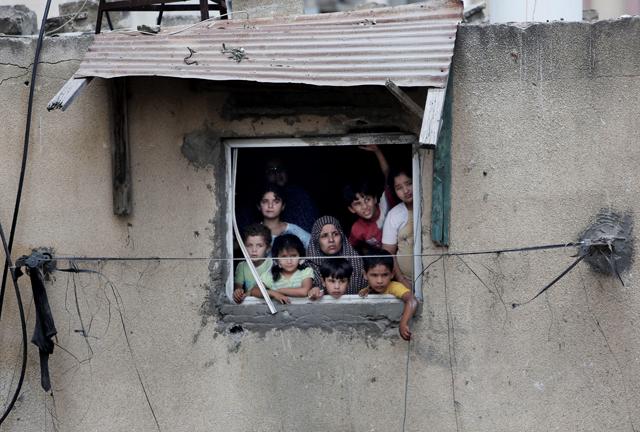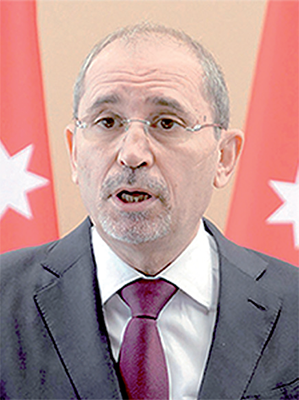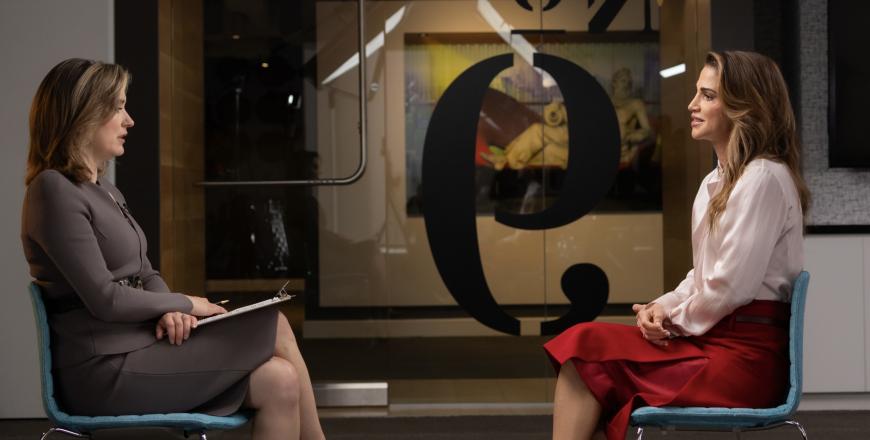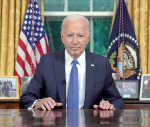You are here
Israel’s blocking of humanitarian aid to Gaza a collective punishment, says Safadi
By JT - Oct 16,2023 - Last updated at Oct 16,2023
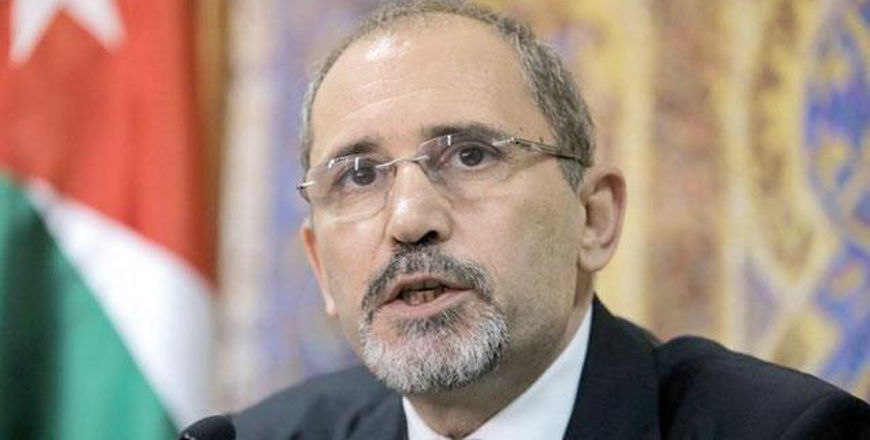
Ayman Safadi
AMMAN — Israel’s denial of access to food, water and basic necessities for Gazans is a policy of collective punishment, said Deputy Prime Minister and Foreign Minister Ayman Safadi.
In an interview with BBC’s Lucy Grey, Safadi said that Jordan is rallying international efforts to halt the escalation in Gaza, stressing that the immediate priority is to protect civilians and facilitate delivery of humanitarian aid to the besieged enclave.
The following is the full transcript of the interview:
Lucy: Welcome to the programme, so the UN, US, Egypt, Jordan and others in the region are working together to ensure civilians have access to water, food, and medical care in Gaza. Rishi Sunak will hold talks later with the King of Jordan who is visiting several European countries to discuss the situation in Gaza. King Abdullah has said that he’s trying to rally international support to stop what he called the war on Gaza. And joining me now in the studio is Jordan’s Foreign Minister Ayman Safadi. Thank you very much for coming in, I suppose let’s start first of all with King Abdullah’s meeting with the Prime Minister Rishi Sunak today, and what is he hoping to achieve from that meeting?
FM: Good morning, obviously out of hearing the enormity of the challenge that the destruction which engulfed the region we’re not able to stop the violence and stop the war and stop the tremendous human toll its taking, we are working with our friends and allies, and particularly here, starting the tour in Britain, trying to see how we can stop the escalation and make sure that civilians are protected from both sides, get humanitarian supplies in, and also look for the day after, but the immediate goal is to stop the violence, stop the war and protect civilians and get humanitarian supplies in.
Lucy: And you may have heard about my conversation earlier with our political correspondent talking about how Rishi Sunak released his statement last night talking about his unequivocal support for Israel, talking about how we stand with Israel not just today, not just tomorrow but always, and he has been criticised for not mentioning the civilians caught up in this in Gaza, was that a disappointing statement for you to hear?
FM: I think when it comes to civilians we came in very clearly in Jordan and the rest of the Arab world, condemning the killing of civilians from both sides, Palestinians lives matter, Israeli lives matter, and we expect that our shared human values would dictate that we take a firm stand all of us against the killing of civilians no matter what their nationality, what their identity is. What we all need to do is to support peace, to all speak against war, against violence as a path to achieving anything, because it will just push us deeper into the abyss of our violence and death and destruction. What we need to do is to support a new path, a path that will get us to a peace that will ensure safety, security for Palestinians, for Israelis and for everybody in the region.
Lucy: We were just hearing in the last few minutes actually about missiles coming, going over into Israel from southern Lebanon, and we’ve been hearing from Hezbollah in recent days talking about how they’re fully ready to get involved when the time comes they said. Do you get this feeling that the wider region being brought into this is inevitable?
FM: The danger is there, we are dealing with a very very tense and difficult situation, as talk of the ground invasion continues, the images coming out of Gaza will just be provocative to everybody, that it will be painful to everybody as were the images that came at the beginning of that, so the possibilities are there. That is why we’re urging for this war to stop, for civilians to be protected, because if that happens then we’re looking at the prospects of a regional war and that would just bring more death, more destruction, more suffering to everybody in the region, and the sad thing is that for years we’ve been warning against this. For years we’ve been saying that violence is not the path. The absence of hope is just not going to get us anywhere and for years we’ve been working on trying to avoid this moment and to open a path that would restore faith in negotiations, as a path to again addressing the legitimate rights of both Palestinians and Israelis. Palestinian right to freedom and statehood, and Israeli right to live in security. These two go hand in hand and you cannot have one without the other.
Lucy: Should we talk about the humanitarian corridors, and what progress has been made on that, if any I suppose. I mean the clear area where people are focusing on is the border of Gaza with Egypt which remains closed, blocking any organizations from going in or out. Has any progress been made?
FM: Unfortunately, till this morning, you know Israel is refusing to allow humanitarian supplies into Gaza and this is just unacceptable by any standard, and again to be frank, why is that denying access to food and water and energy and fuel to Ukraine a war crime, and we’re not hearing the same narrative there? We know what happened is enormous, it’s painful, it’s just beyond words in terms of the human loss it caused, but we cannot do more of the same. I mean why there are 2.3 million people in Gaza, in an area of 140 square kilometres, the most densely populated area, these are innocent people, these are young women, children, elderly. Why should they be punished? Denying access to food is collective punishment and that we should all be clear in saying that none of us want this. None of us want war.
Lucy: Israel will argue obviously that it has a right to defend itself, end of the transfer it suffered a week ago also we’ll talk about how we negotiate with Hamas and it seems like this ground invasion is imminent, doesn’t it, and you know Israel has to take action doesn’t it has to be seen to deal with this situation and it needs to restore security for its people doesn’t it?
FM: Look, we're very clear that we are for the security of Israelis and Palestinians. Again, Palestinians, Israelis both human people, human beings both deserve equal measures of security and protection so that’s a given. None of us would argue the other way. We will not be humans if we don’t. Israelis lives and Palestinians lives matter.
Lucy: Can you see a diplomatic solution to this that there are deaths on both sides and it's going to continue we know that?
FM: Unfortunately, it doesn’t look like that at this point and that’s what we’re saying. If you continue down this path, the only thing that we produce is more death and suffering for Palestinians, for Israelis, and for everybody else. Israel has a right to peace, Palestinians have the right to peace and dignity and security and statehood as well. They go hand in hand. I think instead of just going down the path of war which again there is the real threat of spreading to the whole region. Let’s just, you know I mean the loss has been there and it's painful and sad and it's tragic but let's not go towards more losses from both sides, and let’s focus on what can really bring security and that is stopping the war and all of us coming together behind a pain to stop this once and forever, and that only needs a peace on the basis of the two state solution, we’ve been there before.
Lucy: Can you imagine that this attack happened from Hamas and then there was a realistic path to a two-state solution off the back of it. Can you imagine Israel being willing to do that after this attack that has happened on its soil?
FM: Again, emotions are high, the loss is tremendous, the pain is deep, nobody argues that, but we, it is our job, as people in positions of responsibility to think of how do we really protect our people, how do we really give them a future, war is not going to achieve anything. It is not the first time that we see this, unfortunately. It’s like every year and year, out in this place and what did war achieve? What did the violence achieve? Again, from both sides, it got us nowhere. It got us here. Ultimately, now, I think the priority is just to stop this craziness that is engulfing the whole region and risking pushing us all into the abyss and let’s just you know as terrible as the losses are, you know for the Israelis, for the Palestinians. The question is, how do we get to a place where we are not in this space that we’ve been pushed into, we need to create our own space for peace, now we’re pushed into the space of violence and destruction.
Lucy: Practically do you think that people should be allowed, the Palestinian refugees should be allowed into Egypt, should be allowed to leave?
FM: No, that is an absolute no. Memories of 1948 and 1967 are still pretty much alive among refugees in the region, Gazans need to be protected within Gaza, we will never accept population displacement or transfer. This destruction has to stop, but you cannot transfer the crisis into the region because any talk of population transfer, population displacement is just going to take this conflict into a totally new dimension and that is dangerous.
Lucy: You have 2 million Palestinian refugees in Jordan.
FM: 2.6 are registered with UNRWA as refugees and for us we will never accept that any Palestinian is being pushed out of their country. The answer is again, we have to look beyond this very difficult and very painful moment, as to what can be done to make sure that this is not going to hit us again, as the history in the region has been.
Lucy: OK, well thank you very much for coming in to talk to us. I appreciate your time so much.”
Related Articles
Israel’s war on the Gaza Strip dominated social media in Jordan as well as in the rest of the Arab world on Monday.
AMMAN — Deputy Prime Minister and Foreign Minister Ayman Safadi has underlined that Jordan will take down any projectiles that threaten Jord
NEW YORK – Her Majesty Queen Rania has warned that the world’s failure to prevent Israeli atrocities in Gaza sets a “very dangerous pre


